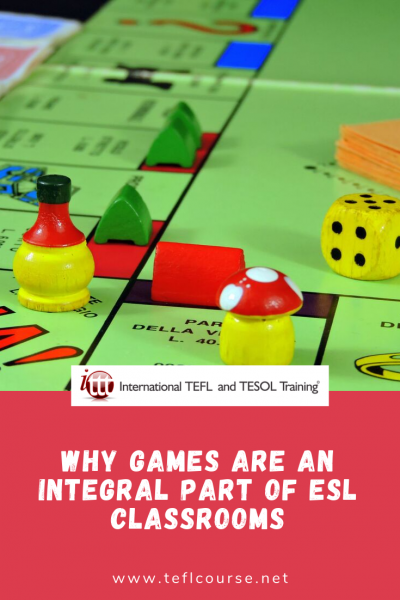Why Games are an Integral Part of ESL Classrooms

Learning an unfamiliar language is no easy feat and with the globalization of the English language, more and more people are faced with the task of learning English to better their lives. It is no secret that English is one of the more difficult languages to learn given its many peculiarities and the lack of clues to pronunciation. This makes learning English not only more complicated but often frustrating for students who have difficulties understanding certain concepts. This is where games can have a huge impact.
This post was written by our TEFL certification graduate Randi B. Please note that this blog post might not necessarily represent the beliefs or opinions of ITTT.
Motivation and Interest
The most important job of any teacher, especially language teachers, is to keep their students motivated and eager to learn. There will be some classes where this is easier than others. However, drilling grammar for an entire lesson or having too much teacher-talk time will surely make the lesson very boring for students. This will cause them to stop listening and therefore will not understand the objectives. Games can make a major difference not only in student participation but also in the amount of information they can retain from the lesson. Each student is different in the way they process information; some students are visual, some auditory and some kinetic and through games we are often able to incorporate all learning styles so that there is equal opportunity for success. It is also much easier to remember concepts that you had fun learning as opposed to content that was simply taught to you.

Also Read: Do I need a degree to teach English abroad?
Confidence
Games are also extremely successful in language classes because it serves to boost the confidence of your students. It is extremely difficult for students of any age to produce unfamiliar language when called upon in a formal setting. Classroom games serve to break the ice and create an environment that welcomes wrong answers without considering them failures. This will encourage students to participate without any added tension or stress which also leads them to produce correct answers more often.
Needs
Variety and versatility are a major advantage of incorporating games into lesson plans. There are games for any topic and most can be adjusted to suit the needs of each specific classroom. Whether you are a one-to-one online teacher or the teacher of a large multilingual class some adaptations can be made for nearly all ESL games. It is extremely important to have variety in lesson plans and games are no exception. While using games can be very successful in the teaching and understanding of concepts, it is still possible for games to become stale if the same ones are used too often. With hundreds of resources available both in print and online, there are so many options in terms of games so ensuring that many types of games are used is very important.
Also Read: What Different Roles Could a Teacher Have During a Lesson?
Useful Materials
A resource that I found to be particularly helpful in discovering new ESL classroom games is a book titled “ESL Games for Classroom 101” written by Michael DiGiacomo. He writes that certain American English resources were missing or difficult to find when he began teaching and therefore decided to write his book to serve the new generation of ESL teachers. In this book, he has 101 various games or activities that are broken down into various learning goals such as; speaking games, listening games, reading and writing games, vocabulary games, spelling and numbers games and grammar games. He gives each game a difficulty level between 1 and 5 which allows teachers to ensure the proper levels for their classroom. While I have not begun teaching yet, I know that this will be a very valuable tool for keeping my students motivated and confident while they build their language repertoire.
Do you want to teach English abroad? Take a TEFL course!
ESL classes and the way they operate can be very diverse depending on the particular schools, the cultural background, the teacher and the students themselves. All of these factors contribute to what the lessons consist of. However, games are a valuable tool in any classroom and should not be overlooked when teaching languages.
Apply now & get certified to teach english abroad!
Speak with an ITTT advisor today to put together your personal plan for teaching English abroad.
Send us an email or call us toll-free at 1-800-490-0531 to speak with an ITTT advisor today.
Related Articles:
- TEFL Breakdown - What Subjects Will Your TEFL Course Cover?
- 5 Reasons Why Teaching English Abroad Enhances Your Career Prospects
- Top 5 Tips: How to Learn a New Language When Teaching English Abroad
- 4 Top Tips for Getting Your TEFL Certificate on the Road
- The How-To Guide for Americans to Teach English in Europe
- 5 Great Places to Teach English Abroad Without a Degree




